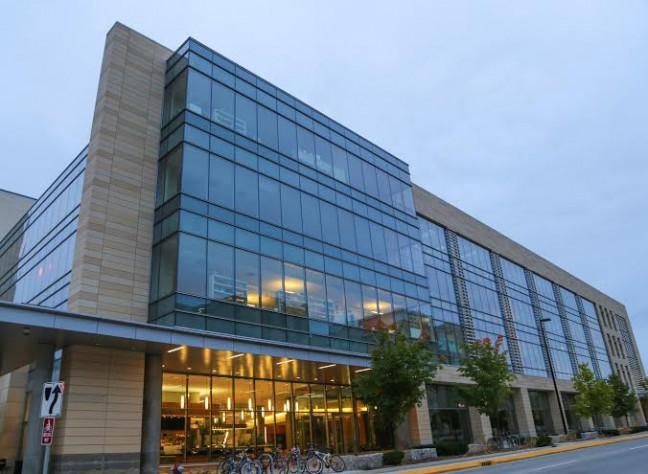For thirteen years, students and teachers from rural Wisconsin high schools travel to Madison for one thing: science.
Beginning in 2007, the Morgridge Institute for Research has hosted the Morgridge Rural Summer Science Camp, two weeks in July of scientific exploration and experimentation. With additional support from the National Science Foundation, the Morgridge Rural Summer Science Camp was able to be extended to three weeks of adventure.
According to the Outreach Coordinator of Morgridge Institute for Research Dan Murphy, the camp was founded in the spirit of the Wisconsin Idea. It seeks to immerse rural high school students into research and allow them to experience a larger, urban research campus.
“The additional week allows for more attendees, as well as a bolstered experience with more opportunities for scientists to share their latest work with the community, including new activities that follow current trends in the research fields,” Murphy said.
Murphy also described the thrill of taking part in coordinating the experience for the students and teachers, and then watching it unfold. Not only do students experience something they never have before, but Murphy described teachers being left in awe as they saw their students thrive. The teachers were also able to collaborate and network with teachers from other rural districts, an additional benefit of the program.
Professor describes the science behind science communication
The Wisconsin Rural Schools Alliance provides support for rural schools and their communities through informing and providing resources to school boards, lobbying and supporting programs such as the Morgridge Rural Summer Science Camp.
Director of the Wisconsin Rural Schools Alliance Kim Kaukl said the camp offers an opportunity for students they may have never been able to experience otherwise, all the while allowing teachers to refresh their own skills and knowledge.
Kaukl also said the impact of the program stretched well beyond the students and teachers in attendance and into entire communities.
“They go back and present to their school boards and it gets out to their communities,” Kaukl said. “It creates a sense of pride that their kids are doing well and can compete at this level.”
SSFC grants eligibility to Students for Agriculture, hears proposal from CWC
Graduate researchers Tiffany Heaster and Amani Gillette both work in Melissa Skala’s lab at the Morgridge Institute — a lab that participates in the camp by presenting research and activities. Heaster and Gillette aid in presenting a lab that allows students to perform treatments on cancer cells and how they react to the different treatments as well as different ways of analyzing the results.
“I think having them able to come in and actually do real-world research gives them context for how research works and helps these students realize that science is a lot more approachable than it seems sometimes,” said Gillette.
Along similar lines, Heaster said these types of experiments allow students to realize that the skills they might be learning in the classroom which seem out of touch with the real world could actually allow them to do something impactful in the future, such as cancer research.
Heaster added that the experience can reach well beyond the week of the science camp and that it connects students with professionals in a career they might be interested in.
“The outreach staff does a really good job of collecting that data and connecting students even after they finish the science camp,” Heaster said. “So, it really goes beyond the week or the couple of weeks that they’re here, which is amazing.”
QuickStart program sparks initial interest for incoming freshmen
What might not be considered is that the researchers themselves feel an impact. Gillette said not only does it feel very rewarding to watch the students’ presentations on the final day, but also that having young, inquisitive minds involved in her research has brought new light to how she approaches some of the challenges she faces in her work.
Heaster shares a very personal connection to the camp, as she herself came from a rural background. Heaster said she was not able to have an opportunity that showed the career opportunities until she was halfway through her undergraduate career.
Heaster said she would always be an advocate for programs such as this and how blown away she was by it.
“I really appreciate the fact that the outreach team has targeted those populations that typically wouldn’t have access to something like this otherwise, and I think it is absolutely incredible,” Heaster said.


















